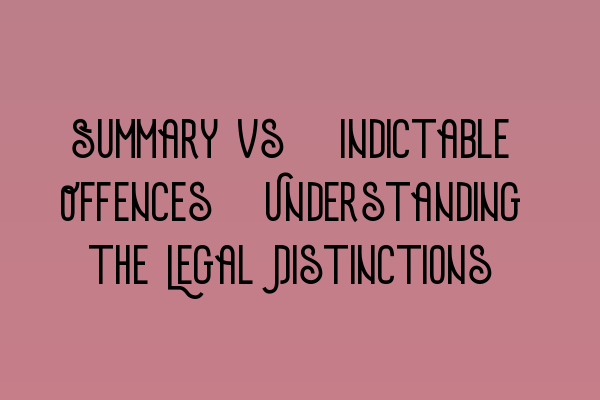Summary vs. Indictable Offences: Understanding the Legal Distinctions
When it comes to criminal law in the United Kingdom, offences are often categorized into two main types: summary offences and indictable offences. Understanding the distinctions between these two categories is crucial for legal practitioners, as it determines the course of legal proceedings and the potential penalties involved.
Summary Offences
Summary offences, also known as minor offences, are less serious criminal offences that are typically heard and resolved in a Magistrates’ Court. These offences are usually dealt with summarily, without the need for a jury trial.
Examples of summary offences include petty theft, public order offences, and minor traffic violations. They are generally punishable by fines, community service, or imprisonment for a period not exceeding 12 months.
For aspiring solicitors practicing criminal law in the UK, it is essential to have a solid understanding of summary offences. The SQE 1 Preparation Courses offered by SQE Criminal Law & Practice Law UK can help you develop the necessary knowledge and skills to excel in this area of law.
Indictable Offences
Indictable offences, on the other hand, are more serious criminal offences that carry higher potential penalties. These offences are typically heard in the Crown Court, where a judge and jury preside over the trial.
Examples of indictable offences include murder, robbery, and drug trafficking. The penalties for these offences can range from lengthy prison sentences to life imprisonment, depending on the nature and severity of the crime committed.
It is important to note that certain indictable offences, such as minor offences under the Theft Act 1968, can be tried summarily if both the prosecution and the defendant agree. This is known as an “either-way” offence, and the choice of venue for the trial depends on various factors.
Preparing for the SRA SQE exams? Enhance your knowledge and practice with the help of SQE 1 Practice Exam Questions and SQE 1 Practice Mocks FLK1 FLK2 provided by SQE Criminal Law & Practice Law UK. These resources will assist you in gaining a comprehensive understanding of criminal law and prepare you for the examinations.
Conclusion
Understanding the distinction between summary and indictable offences is crucial for legal practitioners in the UK. Whether you are dealing with a minor offence that falls under the summary category or a more serious crime classified as an indictable offence, having a solid grasp of the legal distinctions will enable you to provide effective representation and navigate the legal system with confidence.
Ready to take your legal career to the next level? Explore the SQE 2 Preparation Courses offered by SQE Criminal Law & Practice Law UK to enhance your skills and knowledge in preparation for the SRA SQE examinations.
Stay up-to-date with the latest SRA SQE Exam Dates and ensure you are well-prepared to succeed in your legal career.
